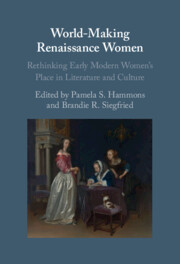Book contents
- World-Making Renaissance Women
- World-Making Renaissance Women
- Copyright page
- Dedication
- Contents
- Figures
- Contributors
- Acknowledgments
- Introduction The Literary Contours of Women’s World-Making
- Part I Early Modern Women Framing the Modern World
- Part II Remaking the Literary World
- Chapter 5 Uncloseted: Geography and Early Modern Women’s Dramatic Writing
- Chapter 6 Lucy Hutchinson’s Memoirs as Autobiography
- Chapter 7 Commonplace Genres, or Women’s Interventions in Non-Traditional Literary Forms: Madame de Sablé, Aphra Behn, and the Maxim
- Chapter 8 Form, Formalism, and Literary Studies: The Case of Margaret Cavendish
- Part III Connecting the Social Worlds of Religion, Politics, and Philosophy
- Part IV Rethinking Early Modern Types and Stereotypes
- Select Bibliography
- Index
Chapter 8 - Form, Formalism, and Literary Studies: The Case of Margaret Cavendish
from Part II - Remaking the Literary World
Published online by Cambridge University Press: 25 November 2021
- World-Making Renaissance Women
- World-Making Renaissance Women
- Copyright page
- Dedication
- Contents
- Figures
- Contributors
- Acknowledgments
- Introduction The Literary Contours of Women’s World-Making
- Part I Early Modern Women Framing the Modern World
- Part II Remaking the Literary World
- Chapter 5 Uncloseted: Geography and Early Modern Women’s Dramatic Writing
- Chapter 6 Lucy Hutchinson’s Memoirs as Autobiography
- Chapter 7 Commonplace Genres, or Women’s Interventions in Non-Traditional Literary Forms: Madame de Sablé, Aphra Behn, and the Maxim
- Chapter 8 Form, Formalism, and Literary Studies: The Case of Margaret Cavendish
- Part III Connecting the Social Worlds of Religion, Politics, and Philosophy
- Part IV Rethinking Early Modern Types and Stereotypes
- Select Bibliography
- Index
Summary
Form is a central category for understanding the works of Margaret Cavendish, and her extensive and sophisticated uses of form should be central to disciplinary debates about the value of formalism. Angela Leighton observes that form is multiple: there are more than twenty dictionary definitions, from “shape, design, outline, frame, ideal, figure, image, style, genre” to “mould lair, print-type, desk, grade, or class.” Form is “dense and crowded,” always “thick with possible echoes and conflicting references.” Though Cavendish is well known for her ostentatious rejection of the constraints of form, she found the varied and variable (even promiscuous) nature of form to be an invaluable resource.
- Type
- Chapter
- Information
- World-Making Renaissance WomenRethinking Early Modern Women's Place in Literature and Culture, pp. 136 - 150Publisher: Cambridge University PressPrint publication year: 2021
- 6
- Cited by



